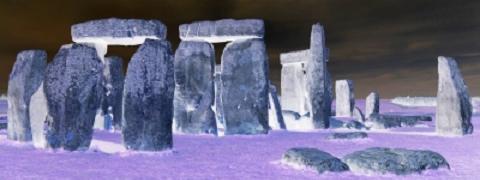[dropcap style=”font-size:100px; color:#992211;”]C[/dropcap]an you name the tribes of Britain?
This was the question put to Tim ‘Mac’ Macartney of Embercombe when he sat in a circle of American Indian elders back in the 1980s. He couldn’t and they derided him for it. They knew: they knew the names of the Celtic tribes, the peoples of Britain before the Romans. “We thought you were educated” they said. “You don’t seem very educated to us.”
Seeing Macartney speak was one of the highlights of Sunrise Celebration. It was Thursday, summer solstice, cold and rainy, and I was bleary with the onset of migraine. We were in the mood to listen, so we picked a talk at random: ‘Dreaming the Ancient Trackways Alive’. Could be good. Most likely bollocks, we thought, but at least it’ll be dry. We weren’t expecting to be moved to tears.
The talk was about the need to mix activism with spirituality. To be an activist is to suffer defeat after defeat after defeat. Without spirituality to recharge and revive us the danger is we fall into bitterness or despair or worse, self-righteousness. The spirituality Macartney advocates is an American Indian charged spirituality of minimal belief – that the earth is sacred.
Now, the mere mention of the sacredness of the earth and American Indian wisdom and my scholarly voice kicks in with a “but but but.” That’s the Western way, to pick holes in things until there’s nothing left. I can do that. It’s useful, necessary even, but cynicism shuts doors and reduces possibilities. I know that to my cost.
[quote]That’s the Western way, to pick holes in things until there’s nothing left[/quote]
And for once I was impressed. Here was someone I could believe. Macartney is honest about his failings and walks his talk, literally. Recently he set off on a pilgrimage to Anglesey in the depths of winter with no compass, map or food, trusting in his bushcraft skills and the kindness of strangers to get him there. He’s in his sixties. His message hit home.
And when he said that failure is simply the refusal to get up, that’s when he really got to me. I’ve tended to think of myself as an ex-activist, that environmental protesting was something I did in my idealistic youth, that actually, there is nothing to be done, ’cause one way or another this ship is going down. In fact, I realise now, I’ve never stopped. All my songs, the instruments I’ve chosen to play, my writing, and most of all my lecturing, all of them are predicated on the one simple belief: that the earth is sacred.
It’s something I’ve known since childhood and actually, in spite of my training first as an ecologist and then in humanities, in spite of all the questioning and doubt, it’s something I’ve never lost. Hear that? That’s the sound of me getting up again.
There were ten or so people in the tent when Macartney started his talk. By the end it was packed and he got a standing ovation. But don’t take my word for it. Here he is. Make yourself a cup of tea, grab the Kleenex, do yourself a favour and listen to what he has to say.
In the meantime I’m brushing off my Classical Studies O-level and learning the tribes of Britain: Dumnonii, Durotriges, Belgae, Regni, Cantiaci, etc, etc….
Sidebar Image: Freedigitalphotos.net/Worakit Sirijinda
A writer and a folk musician, Andy is the author of ‘Shroom: A Cultural History of the Magic Mushroom’ and has published a range of articles and academic papers on subjects as diverse as psychedelics, paganism, bardism, environmental protest, fairies, shamanism and evolution. A modern day troubadour, he plays mandolin, writes songs, and fronts darkly crafted folk band, Telling the Bees. A leading exponent of the English Bagpipes, he plays for brythonic dancing in a trio called Wod.






















